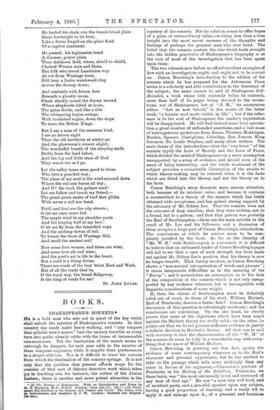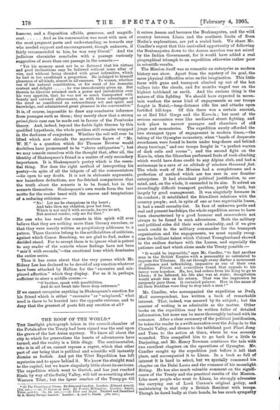BOOKS.
Efn is a bold man who sets out in quest of the key which shall unlock the mystery of Shakespeare's sonnets. In that country the roads make heavy walking, and " airy tongues that syllable men's names" lure the unwary traveller at every turn into paths already white with the bones of innumerable commentators. Yet the fascination of the search seems to outweigh its dangers, for each year adds to the number of these sanguine explorers, while it engulfs their predecessors in a deeper oblivion. Nor is it difficult to trace the sources from which the fascination of the sonnets springs. It is not only that the problem they present affords scope for the exercise of that sort of literary detective work which takes joy in tracking out, for instance, the author of the Junius Letters ; there is another and more potent attraction in the • (1) The Sonnets of Shakespeare. With an Introduction and Notes by H. C. Beeching, M.A., D.Litt. London : Ginn and Co. [3s.]—(2) Shake- speare Self-Revealed in his Sonnets, and Phantir and Turtle. The Texts, with an Introduction and Analyses by J. N. London: Shernat and Hughes. [5.. wt.]
mystery of the sonnets. For its solution seems to offer hopes of a prize of extraordinary value,—nothing less than a true insight into the most secret recesses of the thoughts and feelings of perhaps the greatest man who ever lived. The belief that the sonnets contain the clue which leads straight
into the hidden penetralia of Shakespeare's biography is at the root of most of the investigation that has been spent upon them.
The two volumes now before us afford excellent examples of how such an investigation ought, and ought not, to be carried on. Canon Beeching's introduction to the edition of the sonnets which he has prepared for the Athenaeum Press series is a scholarly and able contribution to the literature of the subject; the same cannot be said of Shakespeare Self- Revealed, a work whose title curiously belies its contents, more than half of its pages being devoted to the revela- tions, not of Shakespeare, but of " J. M.," its anonymous editor. "Let us now behold," is the motto of the latter work, "a human soul made visible in life " ; but if the refer- ence is to the soul of Shakespeare, the reader's expectation will be disappointed. He will find instead some hazy specula- tion, a great number of unfounded assertions, and a vast mass of heterogeneous quotations from Bacon, Thoreau, Montaigne, Ruskin, Spenser, Castiglione, Coleridge, Ben Jonson, King Solomon, Sir Leslie Stephen, and many other writers. The main thesis of the introduction—that the " two loves " of the sonnets typify the Love of Beauty and the Love of Fame, which divided the mind of Shakespeare—is a mere assumption unsupported by a scrap of evidence, and devoid even of the merit of being interesting; and the whole treatment of the subject provides a remarkable illustration of the straits to which theory-making may be reduced when it is the facts which are fitted into the theory, and not the theory on to the facts.
Canon Beeching's essay demands more serious attention, both because of its intrinsic value, and because it contains a counterblast to a theory of the sonnets which has lately obtained wide acceptance, and has gained strong support by the advocacy of Mr. Sidney Lee. That the sonnets were not the outcome of deep emotion; that they were written, not to a friend, but to a patron; and that that patron was probably the Earl of Southampton,—these are the main articles in the creed of Mr. Lee and his followers, and a discussion of them occupies a large part of Canon Beeching's introduction. The conclusions at which he arrives seem to be com- pletely justified by the facts. As far as the identity of "Mr. W. H." with Southampton is concerned, it is difficult to believe that an unbiassed reader of Canon Beeching's pages will fail to see that a case of such strength has been made out against Mr. Sidney Lee's position that his theory is now no longer tenable. That theory involves, as Canon Beeching shows, a "non-natural interpretation of words and phrases "; it raises insuperable difficulties as to the meaning of the " Envoy "; and it necessitates an assumption as to the date of the composition of the sonnets which is not only unsup- ported by any evidence whatever, but is incompatible with linguistic considerations of some weight.
If, then, the claims of Southampton must be definitely ruled out of court, do those of his rival, William Herbert, Earl of Pembroke, deserve a better fate ? Canon Beeching's discussion of this question is refreshingly moderate; and his conclusions are convincing. On the one band, he clearly proves that none of the objections which have been urged against the Herbert theory are really valid ; on the other, he points out that we do not possess sufficient evidence to justify a definite decision in Herbert's favour. All that can be said
with certainty is that the characteristics of the " W. H." of the sonnets do seem to tally in a remarkable way with every- thing that we know of William Herbert.
Canon Beeching, in pointing out this fact, quotes the evidence of some contemporary witnesses as to the Earl's
character and personal appearance, but he has omitted to refer to the passage which tells more strikingly than any other in favour of his argument,—Clarendon's portrait of Pembroke in his History of the Rebellion. Pembroke, we there learn, was " the most universally loved and esteemed of any man of that age." He was " a man very well bred, and
of excellent parts, and a graceful speaker upon any subject, having a good proportion of learning, and a ready wit to apply it and enlarge upon it ; of a pleasant and facetious humour, and a disposition affable, generous, and magnifi- cent And as his conversation was most with men of the most pregnant parts and understanding, so towards any who needed support and encouragement, though unknown, if fairly recommended to him, he was very liberal." And the judicious chronicler concludes with a passage curiously suggestive of more than one passage in the sonnets :-
"Yet his memory must not be so flattered that his virtues and good inclinations may be believed without some allay of vice, and without being clouded with great infirmities, which he • had in too exorbitant a proportion. He indulged to himself pleasures of all kinds, almost in all excesses. To women, whether out of his natural constitution, or for want of his domestic
content and delight he was immoderately given up. But therein he likewise retained such a power and jurisdiction over his very appetite, that he was not so much transported with beauty and outward allurements, as with those advantages of the mind as manifested an extraordinary wit and spirit and knowledge, and administered great pleasure in the conversation."
It is, of course, impossible to draw any conclusive inference from passages such as these ; they merely show that a strong primd-facie case can be made out in favour of the Pembroke theory. And, indeed, beyond the feeble light thrown by this qualified hypothesis, the whole problem still remains wrapped in the darkness of conjecture. Whether the veil will ever be lifted which now shrouds the mysterious figure of " Mr. W. H." is a question which Sir Thomas Browne would doubtless have pronounced to be "above antiquarism "; but we may console ourselves with the thought that, after all, the identity of Shakespeare's friend is a matter of only secondary importance. It is Shakespeare's poetry which is the essen- tial thing. Nor does the right method of interpreting his poetry—in spite of all the inkpots of all the commentators —lie open to any doubt. It is not in elaborate arguments, nor hazardous deductions, nor far-fetched comparisons that the truth about the sonnets is to be found, but in the sonnets themselves. Shakespeare's own words form the best motto for the reader beset with the snares and temptations of a seducing criticism :-
"No ! Let me be obsequious in thy heart ; And take thou my oblation, poor but free, Which is not mix'd with seconds, knows no art, But mutual render, only me for thee."
No one who has read the sonnets in this spirit will ever believe that they are nothing more than literary exercises, or that they were merely written as propitiatory addresses to a patron. These theories belong to the artificialities of criticism, against which Canon Beeching, we are glad to find, makes a decided stand. For to accept them is to ignore what is patent to any reader of the sonnets whose feelings have not been " mix'd with seconds,"—the emotional tone which dominates the entire series.
Thus it has come about that the very poems which Mr.
Sidney Lee has declared to be devoid of any emotion whatever have been attacked by Hallam for the " excessive and mis- placed affection" which they display. For us it is, perhaps, sufficient to steer a middle course :—
" 0 brother, speak with possibilities, And do not break into these deep extremes."
If we cannot recognise anything in Shakespeare's emotion for his friend which is either " excessive " or " misplaced," what need is there to be hurried into the opposite extreme, and to deny that the greatest of poets felt any emotion at all











































 Previous page
Previous page